#한국말 공부하기
Text
Intermediate / Lesson 36: -는 데(에)
안녕하세요! Today we have a short lesson about a useful structure that’s used for talking about what doing an action requires: -는 데(에). Let’s start!
-는 데(에) is used for talking about what it takes to do an action. This will become clearer in the examples, but let’s start with a formula:
[verb stem] + 는 데(에)
The -에 is optional.
This is not to be confused with -ㄴ/은/는데, which does NOT have a space between -ㄴ/은/는 and 데!
Here are some examples:
커피를 한 잔 사는 데에 천원이에요. = It is 1,000 won to buy a cup of coffee.
This example talk about what it takes to do the action of buying a cup of coffee, which is 1,000 won.
떡볶이 만드는 데에 떡고 고추장이 필요해요. = In making tteokbokki, you need rice cakes and red chili paste.
When the verb stem ends in ㄹ, drop the ㄹ!
한국어를 배우는 데에 매일 연습해야 돼요. = You have to practice everyday when learning Korean.
This example talk about what you need to do to learn Korean, which is practice everyday. Notice how you can say you need to do an action or you need a noun when using this structure!
에쎄이를 쓰는 데에 일단 주제에 대한 연구해야 돼요. = In writing an essay, you first have to do research on your topic.
That’s about it for this lesson -- I hope it was helpful! Feel free to reach out if you have any questions :) 다음에 또 봐요!
My masterlist
Join my Discord chat here to practice Korean with others!
Follow me on Instagram here for more Korean content!
Get Drops Premium using my affiliate link to expand your Korean vocab!
Check out my Ko-Fi to support this blog and my studies! Thank you for your generosity!
#korean#korean language#learn korean#learning korean#study korean#studying korean#hangul#korean grammar#intermediate korean#apok#langblr#korean langblr#한국어#한국어 배우기#한국어 공부하기#한국어 문법#한국말#한국말 공부하기#한국말 배우기
81 notes
·
View notes
Text
안녕하세요~~ 요즘 일기 안하네요. 죄송해요. 며칠 전에 thanksgiving이였어요. 가족이랑 재밌게 놀았습니다~ 여러분 잘 지내고 있음 좋겠어요. 저는 잘 살고 있고 재밌게 행복하게 살고 있습니다 ^^
-G🧸
7 notes
·
View notes
Photo

비가 오는 날엔 나를 찾아와
밤을 새워 괴롭히다
비가 그쳐가면 너도 따라서
서서히 조금씩 그쳐가겠지
When it rains, you come to me.
Torturing me through the night
When the rain stops, you follow
Slowly, little by little, you will stop as well
BEAST - On Rainy Days (비가 오는 날엔)
✏️ 𝐕𝐨𝐜𝐚𝐛𝐮𝐥𝐚𝐫𝐲:
1. 비 (n): rain
2. 오다 (v): come
3. 날 (n): day
4. 찾아오다 (v): come visiting
5. 밤 (n): night
6. 새우다 (v): stay up all night
7. 괴롭히다 (v): torment, harass, distress
8. 그치다 (v): stop, end up
9. 따라서 (adv): so, therefore
10. 서서히 (adv): gradually, steadily
11. 조금씩 (adv): little by little
✏️ 𝐆𝐫𝐚𝐦𝐦𝐚𝐫:
1. Adjective/ Verb -은/는/을 N = N that A/V ~noun modifier
E.g. 비가 오는 날 = a rainy day
2. Verb -어/아 가다 = keep doing, going to do ~ literally expresses an action that has been done and keep continuing until future time
E.g. 비가 그쳐가다 = the rain is going to stop
3. Adjective/ Verb -(으)면 grammar = if, when ~express a supposition or a condition about a fact
E.g. 비가 그쳐가면 =When the rain stops
---
🌸 🌼 🌻
Support Me Here
#한국어 문법#한국어공부중#한국어 공부하기#한국어#한국어공부#hangul#Korean Language#Korean Songs#Korean Songs Lyrics#Kpop Songs#Kpop Lyrics#On Rainy Day#Korean Phrases#Korean Quotes#한국어 배우기#한국어배우기#한국말#한국어수업#한국어단어
30 notes
·
View notes
Text
I've been feeling pretty crummy about my Korean lately.
I was applying for jobs the other day, and C1 level was a requirement. I already knew my Korean wasn't C1, but I took a quick online test thingie, and it said I was B1, which isn't BAD, but I know I've lost a lot of Korean since I've been back in the States. Whenever I talk to my Korean friends, they say I sound fine and that nothing has changed (trying not to think about THAT too hard), but I am very much incapable of communicating in Korean the way I could maybe a year ago. I know because there are things I know I was able to say and do in Korean before that I just can't remember how to say and do now, probably because those words are just not useful to me anymore. I no longer need to go into places of business and talk to strangers or about certain things in Korean. I like adding new languages to my life, and I really wanted to make sure I didn't lose my Korean the same way I lost my Chinese. It hasn't gotten to that point yet, and it probably won't, but that job app stuff really got to me...
Last night, I was pretty sleepy, and I thought to look at the Korean subtitles for Fall Out Boy videos for some reason, and I knew...a decent amount of words lol I wonder how those get made? Anyway, I'm gonna use these to study now, if my brain will allow me to focus lol

I got a little emotional at the translations for some parts of these songs for some reason, but yay for building my vocabulary (maybe)!
I wanted to study with all of the Save Rock and Roll videos, but some of them don't have subtitles. ㅠ.ㅠ
18 days to 2ourdust~ 💕🎱🫧
Korean below~ n_n
제가 요즘 제 한국어 실력에 대해서 기분이 안 좋아요.
며칠 전에 새로운 직업이 지원하고 있었는데 C1 정도 필요조건이었어요. 제가 원래 제 한국어 실력이 C1 전혀 아니라고 일고 있었지만 잛은 온라인 시험이 치고 결과는 B1정도였어요. 그건 나쁘지 않지만 저 미국 다시 돌아올땐 부터 지끔까지 한국어 실력이 많이 떠러졌다고 알아요. 제가 한국 친구랑 얘기할 땐, 저 잘한다고 하고 아무거나 바꾸지 않다고 얘기하지만 (그거에 대해서 많이 생각하지 않게 노력하고 있습니다…), 저는 아마도 1년 전처럼 한국어로 의사소통을 할 수 있는 능력이 거의 없어요. 할고 싶은 말 어떻게 말하는지 더 이상 어떻게 말하는지 몰라서 얼마나 떨어졌는지 알아요. 저 더이상 영업소 들어가고 한국말로 얘기하지 않고 더이상 낯선 사람이랑 한국말로 얘기하지 않아요. 다양한 어떤 거에 대해서 얘기하지 않아요. 제 인생에 새로운 외국어 추가하기 아주 좋아하는데 제 중국말 실력처럼 한국말 실력은 다 잃어버리지 않게 만들고 싶었어요. 아직 그 정도 도착하지 않고 그 정도 도착하지 않을 것 같지만 그 취업지원서를 진짜…
어제 저녁에 너무 졸리고 왠지 폴 아웃 보이 비디오 한국어 자막 보기를 생각이 났어요. 보고…단어 어느 정도 알고 었었네요! 그 자막을 어떻게 만들게 됐는지 궁금해요…아무튼 이제는 그거랑 공부하기 시작할 것 같아요. 제 뇌가 제가 집중할 수 있게 해준다면…
왠지 번역하기 보고 감동이 좀 받았어요. 어휘력을 향상시킬 수 있으면 좋겠어요!
세이브 락 엔드 롤 노래랑 다 공부하고 싶었는데 유튜브에서 자막이 없는 비디오를 몇개 있어요. ㅠㅠ
🫧🎱투어더스트까지 18일 남았습니다.🎱🫧
0 notes
Text
어/아 보다 (시도/경험)
anon asked: I just finished reading your most recent blog and im just confused about something. you give us the translation for boda and bo-eda but why do I sometimes see a different verb beside boda? like meokeoboda? Sorry about the romanization, i dont have a korean keyboard on my phone
Hey! It’s not a problem! If you need help figuring out how to add a keyboard to your phone, it’s simpler than you think! Just go the “keyboard” function in your settings then press “add new keyboard” you should see “Korean” or 한국어.
As for your question, I’m going to assume you’re talking about 어/아/여 보다! If I’m not assuming correctly, then please send me another pm or comment on this blog! Hopefully my assumption is correct though!
V ~ 어/아 /여 보다; try, suggest/order (imperative / attempt; 시도)

Conjugate the stem, then add 보다. Not much else to it!
If we attach ~(으)시다 to the grammar point, then we make it a more formal imperative. But if you use intimate style (반말) with your friends, then conjugating 보다 regularly is fine. Here are some formal examples:
치마를 입어 보세요 - Try the skirt on
잘 생각해 보세요 - think about it well
식혜를 마셔 보세요 - try sikhye (Korean rice drink)
Intimate Style:
Sometimes my Korean friends have a hard time saying something in English, and I have a hard time understanding. Usually when this happens, I say, “한국말로 해 봐” which literally just means, “say it in Korean”. If you’re someone who finds it a bit easier to speak informally (like most learners, lol), then here are some other sentences you can use:
When NCT drops another bop and you’re desperate to share it with your friend, say: 잘 들어 봐 - listen well
When your friend is talking too fast in Korean and you can’t keep up, say: 야. 천천히 말해 봐 - yo, speak slower
When your friend has a big test coming up and you wanna support them, say: 공부 열심히 해 봐! 파이팅 - study hard! fighting
V ~ 어/아/여 보다 + 과거 = 어/아/여 봤어요; have tried (experience; 경험)
Here’s where it get’s interesting! If you conjugate 보다 in the past tense when attached to a verb, it talks about past experience. However, this is a very specific example that has happened in the past (usually a distant past, not one that happened recently). Here are some examples:
한국에 가 봤어요 - I’ve been to Korea
감자탕 먹어 봤어요 - I’ve tried gamjatang (Pork Bone Stew)
어렸을 때 미국에 살아 봤어요 - I lived in the US when I was young
If you want to ask someone if they’ve ever done something, or tried something, then just add a question mark!
감자탕 먹어 봤어요? - have you ever tried gamjatang?
노래방에 가 봤어요? - have you ever been to karaoke?
스키 타 봤어요? - have you ever been skiing?
If you want to say that you haven’t done the thing that they’re asking, then add 안 before the main verb. EX. 아니요. 감자탕 “안” 먹어 봤어요 - No. I haven’t tried gamjatang. You can also use “못” instead of “안”. I have used both in the same context and it means the same thing!
V ~ (보다) + (으)ㄴ 적(이) 있다/없다 = have done V / haven’t done V (experience; 경험)
Another way to express experience in the past with / without 보다 is (으)ㄴ 적(이) 있다/없다. 적 is a dependent noun related to time! Here are some examples:
떡볶이 먹은 적이 있어요 - I’ve eaten tteokbokki (Korean spicy rice cake)
서울에 산* 적이 없어요 - I have never lived in Seoul!
With 보다:
소주 마셔 본 적이 있어요 - I’ve tried soju
한복 입어 본 적이 없어요 - I haven’t tried wearing a Hanbok!
*살다 (to live) is an irregular ㄹ verb, therefore ㄹ acts as a vowel/is omitted in most grammatical instances. Other irregular ㄹ verbs you may know: 만들다 (to make), 알다 (to know), 울다 (to cry), 열다 (to open), 팔다 (to sell), many more!
When saying that you’ve watched something, or haven’t while using 보다 in the sense of “to see”, you wouldn’t say 봐 봤어요 or 봐 본 적--, it’s just grammatically incorrect and honestly, unnatural sounding. You would just say 본 적 or 봤어요. The Korean person you’re talking to will understand the context instantly. Here are some examples to illustrate this:
영화 기생충 봤어요(?) - Have you seen/I have seen “Parasite”(?)
드라마 알랑말랑 본 적이 있어요 - I’ve watched the drama “알랑말랑”
Hope that answers your question! I would say this grammar point is maybe A2-B1! Pretty easy and once you get it, you’ll start to understand some more intermediate sentences a lot better! If you’re still confused, or, again, I assumed wrong, then don’t hesitate to send me another message/pm! I’ll help you right away!
Happy Learning :)
~ SK101
#한국어#한국어 배우기#한국어 공부하기#한국말#한국어 문법#보다#보다 + 과거#보다 경험#보다 시도#(으)ㄴ 적이 있다/없다#korean#korean ask#korean grammar#learn korean
90 notes
·
View notes
Text
N+치고(는)
1. N+치고
— is used to indicate that the preceding statement is the same as the following statement without an exception.
동물울 좋아하는 사람치고 나쁜 사람을 본 적이 없어요. When it comes to people who love animals, I've never met a bad one.
요즘 대학생치고 취업 걱정을 안 하는 사람이 있을까요? For today's university students, is there anyone who doesn't worry about work?
학생치고 방학 싫어하는 사람은 없을 거예요. For students, there is no one who does not like holidays.
인기 있는 가수치고 연기 안 하는 사람은 없는 것 같아요. Talking about famous singers, It seems that there is anyone who doesn't act.
부모님치고 아이 걱정 안 하는 사람은 없을 거예요. There is no parent who doesn't care about their children.
2. N+치고는
— used to indicate that the following statement is an exception to the previous statement.
오늘은 봄 날씨치고는 꽤 쌀쌀한 편이에요. It's pretty chilly today for spring weather.
어제 놀이공원에 갔는데 휴일치고는 사람이 별로 없었어요. I went to the amusement park yesterday, but for a holiday, there were not many people.
외국인치고는 한국말을 아주 잘해서 다른 한국 사람인 줄 알았어요. For a foreigner, he spoke Korean very well, so I thought he was another Korean.
#korean blog#korean#korean language#study korean#learn korean#korean grammar#한국말#한국어#한국어 배우기#한국어 공부하기#한국어공부중#한국
85 notes
·
View notes
Text
🧸 It’s been 1.5 years 🧸

Hello… I do not know where to start and what would be fitting to say. As some of you may have noticed, my last post is from the end of August 2020, during the midst of the p-word. I have opened this blog on multiple occasions since then and have contemplated posting something new, helping you staying motivated to strive towards a better version of yourselves by expanding and broadening your knowledge.
♡
The thing is, though, that every time I began to think about what to write, I found myself feeling drained and overwhelmed. My follower count was at 3100 and I had found such a sweet, supportive community on langblr — until the panini hit. My mental health deteriorated and I strove away from feeding my hunger for learning new things.
Additionally to that, it was my last year of high school; stressing about my graduation in this situation really sucked the last ounce of energy straight out of my bones. I stopped journaling, stopped learning Korean, stoppen writing essays, stopped dancing etc. etc. Instead, I fled to fantastic worlds and immersed myself in books.
At this point, I do not know where to pick up old habits again, because I feel that through all the events since the start of 2020, I forgot how to be myself. I lost so many passions along the way and lately, that has been hard on me and my health.
It is just the beginning of this year, 2022, that I began rediscovering myself through studying new things, picking up sports again (still a long way to go…) and so on.
As sad as this is, I must admit that I forgot what feels like 80% of the things I know (now ‚knew‘, I figure) about Korean. When I scrolled through my old blogposts yesterday morning, I felt some sort of spark ignited; I want to continue my Korean journey — yet it feels like I’m swimming in a vastly open sea with nothing to hold onto in sight. My perfectionism keeps me from admitting to you, that my posts might lack quality (?) as I have to refresh all the things I once learned. But honestly, I believe that is part of the journey which I am willing to take into account in order for myself to grow as an individual.
♡
This post is pretty lengthy so I want to thank you who read this all and I ask for your understanding, too. I will try my very best to be there for you, so that we can tackle this journey together.
I appreciate you all so much. 화이팅!
#i'm back y'all#korean language#korean#learning korean#studyblr#langblr#language study#hanguk#language learning#academia#한글#한국어 배우기#한국말#한국어 공부하기
8 notes
·
View notes
Text
Korean Honorifics
안녕! 잘 지냈어요? I hope everyone is doing okay during this time. I have come back with a post all about Korean honorifics because, well, let’s be honest, they’re really important when you’re learning Korean. Not only are they a part of the language, but a part of the culture as well. Alright, let’s jump right in! 가자!
First of all: What even is an honorific? An honorific, in short, is a syllable(s) in Korean You attach to the end of a person’s name to show them respect. In English, the equivalent is « sir » or « ma’am ».
Second: When will I ever use an honorific? All. The. Time. Literally, every single day. I use them when talking with my teachers or even my friends. Why? Because honorifics can show one of two things: respect or endearment.
But Sàf, I thought honorifics were only for people older than you
That’s sort of correct. You use honorifics like « Mr/Ms/Mrs » when talking to someone in your workplace/school, just like you use « dear/honey » when talking to someone you adore. Honorifics aren’t just for people older than you, and they aren’t just for strangers.
With all that being said, let’s start talking about formal honorifics (because yes, there are also informal ones)!
씨
This is the most obvious one for most learners. You’ll hear this used practically everywhere. When added to a name, it means « Mr/Mrs/Miss ». It’s a very common honorific. It’s a go-to for anyone who is at an equal social standing as you, even if you don’t know them. You’ll add 씨 to then end of someone’s first name.
Example: 이미래 씨 (Ms. Lee Mi-rae)
Or more casual: 미래 씨 (Ms. Mi-rae)
Note that you shouldn’t attach it to someone’s surname (as in 이 씨) because this is seen as rude, disrespectful, and inappropriate.
군/양
I wasn’t very sure about adding these ones into the post just because they aren’t super common anymore and they are more used by the older generations, but, it’s good to include these because you should stray away from them.
군 is used as a term for a younger, unmarried male, and 양 is used for a younger, unmarried female. You would typically hear these at formal events like weddings.
The difference between 군/양 and 씨 is that you can attach 군/양 either after a person’s first name or surname. It isn’t seen as rude if you attach 군/양 after the surname, unlike 씨.
Note that these are used by older generations and that the younger generations now see these as condescending and the listener will think you want them to be submissive and assume to gender roles. These two are a no-no so it’s best to stay away from them.
님
Going to be honest, this one is one of my favourite honorifics (don’t ask why because I even don’t know). So, if you wanna go the extra mile with respect, definitely use 님. 님 is used when talking to someone with a profession or skill/status in something. 님 is also a step up from 씨.
Examples: 선생님 (teacher), 목사님 (pastor)
형/누나
형 and 누나 are used if you are a male and you are speaking to someone you are close to taht is older than you. 형 if the older person is a male, and 누나 if the older person is a female
Examples: 아! 형아! 여기에요! (Ah! Hyung-ah! Over here!) 누나는 저녁을 요리했어요. (*Nuna* cooked dinner.
오빠/언니
오빠 and 언니 are used if you are a female and you are speaking to someone you are close to that is older than you. 오빠 if thé the other person is a male, and 언니 if the other person is a female.
Examples: 오빠 왜 이렇게 됐을까? (*Oppa* why did this happen?) 언니, 쇼핑하고 갈 거예요? (*Eonnie* are you going to go shopping?)
That’s it for today’s lesson! I hope everyone found these super useful! If anyone ever needs some practice with reading and understanding Korean, you can send in an ask or send me a message! I get back to people as fast as I can. Thank you everyone! I’ll see you in the next post! 안녕!
#studyblr#langblr#korean language#한국어#korean studyblr#korean study blog#korean lang blog#korean langblr#한국어공부#한국어 공부하기#한국말#한국#공부#한국어배우기#한국어 공부해요
147 notes
·
View notes
Text
Hanja 하자
So if you are like me, you may not be great at learning Hanja due to the actual characters themselves. 質 - It’s can be a bit intimidating. Especially when [ 火 / 禍 / 化 / 畵 ] all can be a different 화. So instead of looking at the actual Chinese character, we’ll look at some important various meanings of hanja for intermediate Korean. This type of pattern learning will help you be able to deconstruct words with some context.
Here are some hanja that have frequently appeared for me recently:
~질 (質)
Meaning: Quality
Temper, Personal Nature - 성질
Characteristic - 특질
Geological Features - 지질
Illness - 병질
~력 (力)
Meaning: Strength or ability
Vitality, Vigor - 활력
Main Force / Strength - 주력
Frictional Force - 마찰력
Memory - 기억력 바보력
~화 (化)
Meaning: Conversion
Eng. Suffixes: -ization
Industrialization - 산업화
Commercialization - 상업화
Change, Alteration - 변화
적 (的)
Meaning: Disposition, Function, Connection
Eng Suffixes: -ical or -ive
Positive - 긍정적
Negative - 부정적
Passive - 소극적
Aggressive - 공격적
Psychological - 심리적
Physical - 신체적
These are all SUFFIXES so if you see them at the END of a word - for example: 화요일 vs 상업화 - these are obviously different 화s. But if you have the actual Chinese character you can check in a dictionary!
Hopefully this helps and let me know your favorite Hanja!
#한국어#한국말#한자#한글#한국어 공부하기#한국어배우기#한국어 공부#공부하기#공부중#같이 공부하자#한국어 배우기#korea#korean#korean language#language#korean vocab#korean vocabulary#learn korean#hangul#hanja#learning korean#study korean#studywithme#studyblr#langblr#korean langblr#studyspo#study inspo
138 notes
·
View notes
Text
Korean for Beginners #1
Abstract
안녕하세요 ! First, you should know that I'm myself a beginner in Korean, BUT an upper beginner. More my level will be progressing, more I will make content more advanced.
I will try to write a blog (not all the time) where I learn you Korean. I have a story in French on Wattpad, where I learn Korean but I'll perhaps also write another but in English.
2 notes
·
View notes
Text
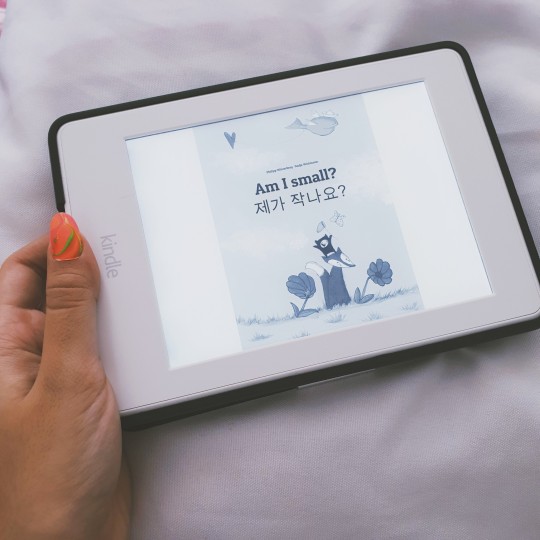
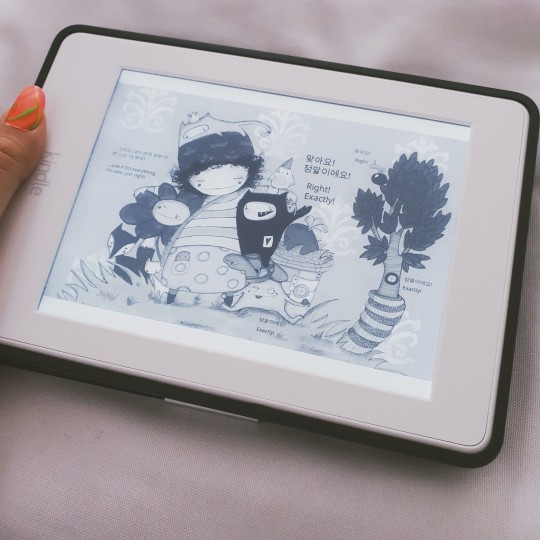
2020.06.03 // i read this book a few days ago and it's just so sweet! also it's really good if you're a begginer, the vocab is super simple. there are other editions with other languages so even if you don't study korean check it out cause probably there's one with your target language!
#studyblr#studyblr brazil#studyspo#korean langblr#korean language#langblr#langblr korean#languages#polyglot#한국어 공부#한국어#한국말#한국어배우기#한국어 앍기#learn korean#공부하기#공부#leticia studies
42 notes
·
View notes
Text
Advanced / Lesson 23: Korean Idioms
안녕하세요 여러분! Today I have an advanced lesson I'm that I posted on my Instagram recently: it's about Korean idioms! I learned these in my Korean class while abroad and enjoyed them a lot, so I hope you do too! Let's start!
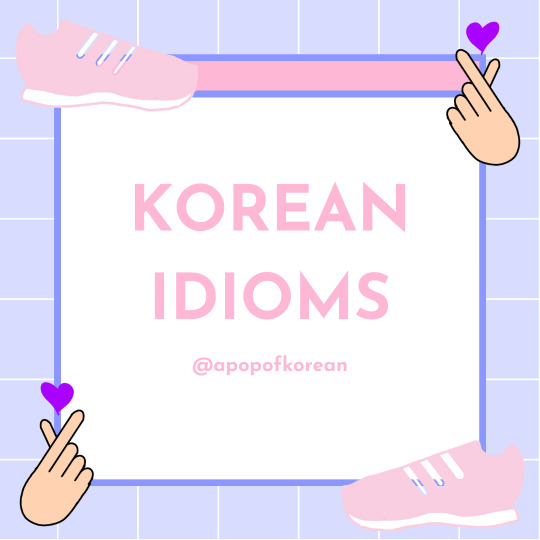
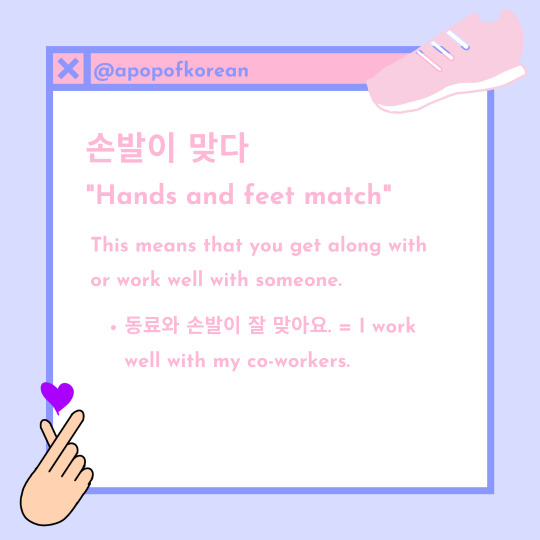




My masterlist
Join my Discord chat here to practice Korean with others!
Follow me on Instagram here for more Korean content!
Check out my Ko-Fi to support this blog and my studies! Thank you for your generosity!
#korean#korean language#learn korean#learning korean#study korean#studying korean#korean langblr#langblr#advanced korean#한국어#한국어 배우기#한국어 공부하기#한글#한국말
120 notes
·
View notes
Text
월요일 10/23/23
오늘 아침 10시에 잤고 오후 4네시 일어났어. 지금은 밤 7시 50분이고 날씨가 오락가락하고 있이니까 나 감기 걸렸고 이제 친구들이랑 전화하면서 따뜻한 차를 마시고 있는데 목이 너무 아파가지고 말 잘 못해. 내가 좋아하는 사람이 작년에 사라졌는데 오늘 찾았어.. 그래서 기분 너무 좋고 너무 행복해. 목이 좀 아픈데 노래 불렀어. 그리고…춤도 췄고 게임도 했어. 자기 전에, 겐신 했어.
-G🧸
#language#langblr#linguistics#한국어 연습#한국어 공부#한국어 공부하기#한국어 배우기#한국말#korean language#korean langblr#korean
7 notes
·
View notes
Photo

"모든 사람은 천재다.
하지만 물고기들을 나무 타기 실력으로 평가한다면,
물고기는 평생 자신이 형편없다고 믿으며 살아갈 것이다."
“Everybody is a genius.
But if you judge a fish by its ability to climb a tree,
it will live its whole life believing that it is terrible.”.
✏️ 𝐕𝐨𝐜𝐚𝐛𝐮𝐥𝐚𝐫𝐲:
모든: every
사람: human, person
천재: genius
물고기: fish
나무: tree
나무 타기: tree climbing
실력: ability, capability
평가하다: evaluate, measure, rate
평생: entire life, whole life
자신: self, oneself
형편없다: terrible, awful, miserable
믿다: believe, trust
살아가다: live
✏️ 𝐆𝐫𝐚𝐦𝐦𝐚𝐫:
1. A/V-ㄴ/는다면 grammar = If ~ Hypothesize a situation contrary to the past or happening in present or not yet occurred (Refers to events which have little or no chance to occur).
E.g.
내 맘이 고백했다면 (If I confessed my feelings)
복권에 당첨된다면 (If I win the lottery)
2. A/V-(으)며 = while/ during / and ~ Mentioning or listing two things, actions, status, etc. in a row in a sentence
E.g.
저는 영화를 보며 콜라를 마셨어요
(I drank cola while watching a movie)
3. A/V-ㄴ/는다고 믿다 = believe that ~ If one “believes” something, quoted can be used.
E.g.
저는 착하게 산다고 믿어요
(I believe I live my life being kind)
🐟
Kindly Visit My Blog Here
Available Products Here
Available Korean Writing Notebook Here
#Korean Quotes#positive quotes#Korean Language#Learn Korean#study korean#Study with me#한국어공부중#한국어 배우기#한국어 단어#한국어배우기#한국어능력시험#한국어 문법#한국어 연습#한국어 공부하기#한국어#한국말#hangul
13 notes
·
View notes
Text
So, I've decided to partake in a new habit.
I'm gonna keep a journal in my target language
Why am I doing this?
to see what vocabulary I should learn based on my daily life
to strengthen my bond with the language and train my brain to use it
to have fun and make it fun

#korean language#language challenge#language learning#language study#한국어배우기#korean#kr#language lover#good habits#writing habit#self improvement#study hard#studyenglish#studyspo#journal#target language#speaking#writing#한국어 공부하기#한국말
30 notes
·
View notes
Text

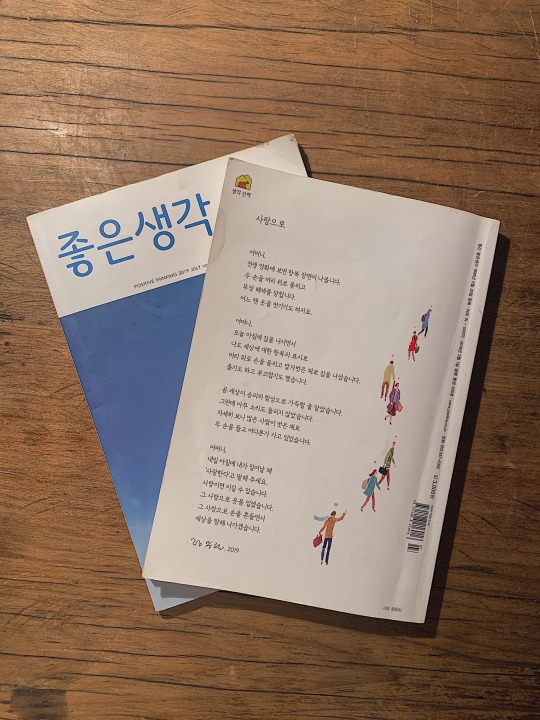
Reading is such a good way to learn and memorize new vocabulary! These are magazines called 좋은 생각 in which people write short overwhelming, healing stories. I think you can pay a subscription to receive them every month...? I’m not sure though;;;
#studyblr#langblr#korean#literature#한국어 공부하기#한국어#한국어 연습#한국말#읽기#책#잡지#studyspo#studygram#languages#books#reading#study#student#studyspace#philoblr
13 notes
·
View notes